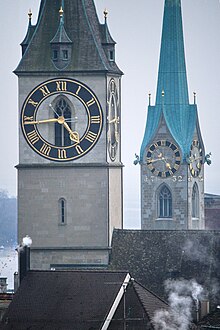
Back الدين في سويسرا Arabic সুইজারল্যান্ডের ধর্মবিশ্বাস Bengali/Bangla Religió a Suïssa Catalan Náboženství ve Švýcarsku Czech Religionen in der Schweiz German Religión en Suiza Spanish Religion en Suisse French Religija u Švicarskoj Croatian Religioni in Svizzera Italian Религија во Швајцарија Macedonian
Religion in Switzerland (age 15+, 2022)[1][a]

Religion in Switzerland is predominantly Christianity. According to the national survey of the Swiss Federal Statistical Office,[a] in 2022, Christians accounted for 58.2% of the resident population (aged fifteen years and older), of whom 32.1% were Catholics, 20.5% were Swiss Protestants, and 5.6% were followers of other Christian denominations (about half Orthodox and half other Protestants).[3] The proportion of Christians has declined significantly since 1980, when they constituted about 94% of the population; during the same timespan, unaffiliated Swiss residents have grown from about 4% to 31% of the population, and people professing non-Christian religions have grown from about 1% to 7.2% of the population.[4] In 2020, according to church registers, 35.2% of the resident population were registered members of the country's Catholic Church, while 23.3% were registered members of the Protestant Church of Switzerland.[5][b]
Christianity was adopted by the Gaulish (mostly Helvetii) and Germanic (mostly Alemanni) ancestors of the modern Swiss, respectively, between the 4th- and 5th-century late Roman domination the former, and between the 6th- and 7th-century Frankish domination the latter, abandoning their indigenous Gallo-Roman and Germanic paganisms. The Old Swiss Confederacy which began to emerge in the 13th century remained entirely Catholic until the 16th century, when it became one of the centres of the Protestant Reformation and a majority of the Swiss joined the Protestant movement of Calvinism.[6] Conflicts, and even civil wars, between Protestants and Catholics persisted until the Sonderbund War in 1847, after which freedom of conscience was established by law — only for Christians.[7] Legal discrimination against Jews and some restrictions against the Catholic Church persisted, respectively, until the late 19th century the former and the end of the 20th century the latter.[8] In the early 20th century, Switzerland had an absolute majority of Protestants (about 60%) and a large population of Catholics (about 40%); since the late 20th century and throughout the 21st century, the religious composition of the country has changed significantly, with a rise of the irreligious population, a sharp decline of Protestantism to about two tenths of the population, and a less sharp decline of Catholicism to about three tenths of the population.[4]
Switzerland has no state religion, though most of its cantons (except for Geneva and Neuchâtel) recognise official churches (Landeskirchen), in all cases Catholic and Swiss Protestant, and in some cantons also the Old Catholic Church and Jewish congregations.[9] These churches are financed by taxation of their adherents.[10][11]
- ^ "Religions" (official statistics). Neuchâtel, Switzerland: Swiss Federal Statistical Office. Retrieved 2024-02-02.
- ^ "Methodological basis for research and regional partners [Accuracy of results; Cumulated data-pooling]". Neuchâtel, Switzerland: Swiss Federal Statistical Office.
- ^ "Religions". www.bfs.admin.ch. Retrieved 2024-10-06.
- ^ a b "Religionszugehörigkeit seit 1910" [Religious affiliation since 1910] (XLSX) (official statistics). Neuchâtel, Switzerland: Swiss Federal Statistical Office.
- ^ "Kirchenmitgliedschaft in der römisch-katholischen und evangelisch-reformierten Kirche nach Kantonen (2018)" [Church membership in the Roman Catholic and Evangelical Reformed Churches by cantons (2020)] (church statistics). St. Gallen: SPI.
- ^ Haug & Wanner 1999, p. 4; Pahud de Mortanges 2015, p. 687.
- ^ Haug & Wanner 1999, p. 4; Pahud de Mortanges 2015, p. 688.
- ^ Pahud de Mortanges 2015, p. 688.
- ^ Pahud de Mortanges 2015, pp. 697–698.
- ^ "Die Kirchensteuern (Stand der Gesetzgebung: 1. Januar 2013)" [Church taxes (legislation status as of 1 January 2013)] (PDF) (in German, French, and Italian). Berne: Swiss Tax Conference (CSI). Archived from the original (PDF) on 21 September 2020.
- ^ Frey, HDS 2007.
Cite error: There are <ref group=lower-alpha> tags or {{efn}} templates on this page, but the references will not show without a {{reflist|group=lower-alpha}} template or {{notelist}} template (see the help page).